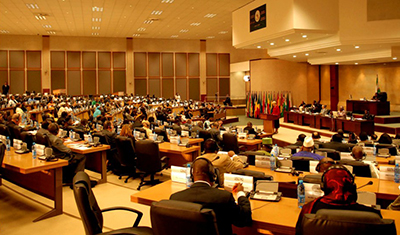The Pan African Parliament’s (PAP) launch of a media freedom campaign through a “Dialogue on Media Freedom in Africa” in mid-May marks an important and welcome starting point. For too long, media freedom has been divorced from the debate around development and democratization when it has an integral role to play in promoting transparency, underpinning good governance, and enabling citizens to make informed decisions.
However, the week after the Pan African Parliament (PAP) released the “Midrand Declaration on Press Freedom in Africa,” on May 15, CPJ reported on a media crackdown in Uganda, the hostile environment facing reporters in Kenya, and threats made by a Liberian presidential aide against journalists critical of him or the presidency. These are but three examples that illustrate the yawning gap between policy and implementation challenging governments across the continent. They also offer a sobering footnote to the diverse interpretation of media freedom articulated by various Pan African parliamentarians who took part in the one-day dialogue that endorsed the declaration.
The Midrand Declaration draws on a variety of African protocols, articles, and declarations, including Article 9 of the African Charter on Human and People’s Rights that underscore the right of Africans to freedom of expression, as well as the Declaration of Table Mountain that seeks to abolish “insult laws” and criminal defamation. It also initiates a campaign on “Press Freedom for Development and Governance: Need for Reform” in the continent and the establishment of an annual press freedom index.
PAP President Bethel Nnaemeka Amadi opened the discussion by saying that press freedom was essential in a modern democracy. He said he hoped the result of the day’s deliberations would be that countries would replace laws that hamper freedom of expression with those that give people access to the “critical tool” of information.
Kwame Karikari, director of the Media Foundation for West Africa, said that the main source of danger threatening the African media came in the guise of criminal legislation. He said that more and more governments were resorting to using laws like insult to the president or religion, criminal defamation, false publication, and damaging a person’s honor to suppress media freedom.
PAP members were outspoken and sharply divided in their responses to the presentations lauding the merits of a vibrant and free press. While several parliament members reiterated the importance of press freedom and its close link with democracy, others castigated the media on allegations of Western bias and control and a lack of accountability and disrespect to African leaders.
“We have too much freedom in Tanzania,” one parliamentarian said. “I suggest we should have our own [African] definition of freedom of expression. We have to be careful. Conflict is caused by the media.”
A Malawian parliamentarian lambasted the media for its “irresponsible and sarcastic reporting.” Journalists, he said, had to be more “objective.” He objected to MISA’s characterization of South Africa President Jacob Zuma as “thin-skinned” because of the civil defamation charges he had instituted against the media and said it was not the media’s role to make people look like fools.
By contrast, a Ugandan MP, in a remark prescient of last week’s events in Kampala, said, “Closing media, radio stations does not bring about democracy. We need to ask ourselves some questions: If you do not have anything to hide, why don’t you explain your cause on any media?”
But if PAP members are divided in their understanding of the value of a vibrant, free, and independent media, they are united in their frustration that the PAP is unable to pass binding legislation or enforce any resolutions. For now, the PAP can only take the four sub-themes of the media freedom campaign–safety of journalists and impunity; law reform; the building of a sustainable industry; and access to information–and encourage a series of dialogues in the other four regions of the continent.
Consensus notwithstanding, at least the agenda is set and a parliamentary conversation has begun.
